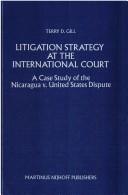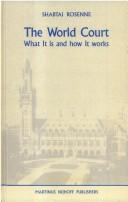| Listing 1 - 10 of 40 | << page >> |
Sort by
|

ISBN: 0792303326 Year: 1989 Volume: 9 Publisher: Dordrecht : M. Nijhoff,
Abstract | Keywords | Export | Availability | Bookmark
 Loading...
Loading...Choose an application
- Reference Manager
- EndNote
- RefWorks (Direct export to RefWorks)
Intervention (International law) --- Intervention (Droit international) --- International Court of Justice --- Nicaragua --- United States --- Etats-Unis --- Trials, litigation, etc --- Claims vs. United States --- Procès, litiges, etc --- Réclamations contre Etats-Unis --- Intervention (International law). --- Procès, litiges, etc --- Réclamations contre Etats-Unis --- Trials, litigation, etc. --- Claims vs. United States. --- Intervention (droit international). --- International Court of Justice. --- Cour internationale de justice --- Études de cas. --- Réclamations contre les États-Unis.
Book
ISBN: 1281979465 9786611979461 9048508967 9789048508969 9789056292560 9056292560 9781281979469 6611979468 Year: 2002 Publisher: Amsterdam Vossiuspers
Abstract | Keywords | Export | Availability | Bookmark
 Loading...
Loading...Choose an application
- Reference Manager
- EndNote
- RefWorks (Direct export to RefWorks)
September 11 Terrorist Attacks, 2001. --- Aggression (International law) --- Self-defense (International law) --- Intervention (International law) --- Military intervention --- Diplomacy --- International law --- Neutrality --- 9/11 Terrorist Attacks, 2001 --- 911 Terrorist Attacks, 2001 --- Attack on America, 2001 (September 11 Terrorist Attacks) --- Nine-Eleven Terrorist Attacks, 2001 --- Pentagon-World Trade Center Terrorist Attacks, 2001 --- Sept. 11 Terrorist Attacks, 2001 --- September 11 Terror Attacks, 2001 --- September 11 Terrorism, 2001 --- Terrorist Attacks, September 11, 2001 --- World Trade Center-Pentagon Terrorist Attacks, 2001 --- Hijacking of aircraft --- Terrorism
Book
ISBN: 9462653992 9462653984 Year: 2021 Publisher: Berlin, Germany : Springer : Asser Press,
Abstract | Keywords | Export | Availability | Bookmark
 Loading...
Loading...Choose an application
- Reference Manager
- EndNote
- RefWorks (Direct export to RefWorks)
The main theme of this volume of the Yearbook of International Humanitarian Law is the 70th anniversary of the Geneva Conventions. The evolution of these crucial treaties and international humanitarian law more generally comes back in six chapters addressing topics such as sieges, compliance, indiscriminate attacks and non-state armed groups. The second part of the book contains a chapter on the acquittal on appeal of Jean-Pierre Bemba Gombo by the International Criminal Court on the basis of command responsibility for war crimes, as well as an extensive Year in Review describing the most important events and legal developments in the area of international humanitarian law that took place in 2019. The Yearbook of International Humanitarian Law is the world’s only annual publication devoted to the study of the laws governing armed conflict. It provides a truly international forum for high-quality, peer-reviewed academic articles focusing on this crucial branch of international law. Distinguished by contemporary relevance, the Yearbook of International Humanitarian Law bridges the gap between theory and practice and serves as a useful reference tool for scholars, practitioners, military personnel, civil servants, diplomats, human rights workers and students.
International humanitarian law. --- International criminal law. --- Human rights. --- Public international law. --- International Humanitarian Law, Law of Armed Conflict. --- International Criminal Law . --- Human Rights. --- Public International Law . --- Humanitarian law. --- Humanitarian conventions --- International humanitarian law --- War (International law)
Book
ISBN: 9462654905 9462654913 Year: 2022 Publisher: The Hague, Netherlands : T.M.C. Asser Press,
Abstract | Keywords | Export | Availability | Bookmark
 Loading...
Loading...Choose an application
- Reference Manager
- EndNote
- RefWorks (Direct export to RefWorks)
Humanitarian law. --- Humanitarian conventions --- International humanitarian law --- War (International law)
Digital
ISBN: 9789462651418 Year: 2016 Publisher: The Hague T.M.C. Asser Press
Abstract | Keywords | Export | Availability | Bookmark
 Loading...
Loading...Choose an application
- Reference Manager
- EndNote
- RefWorks (Direct export to RefWorks)
The general theme of this volume is contemporary armed conflicts and their implications for international humanitarian law. It is elaborated upon in several chapters, dealing with a variety of topics related to, among other things, the situations in Libya, Transnistria, Mexico, Syria/Iraq (Islamic State) and Israel/Gaza. Besides these chapters that can be connected to the general theme, this volume also contains a chapter dedicated to an international criminal law topic (duress), as well as a Year in Review, describing the most important events and legal developments that took place in 2015. The Yearbook of International Humanitarian Law is the world’s only annual publication devoted to the study of the laws governing armed conflict. It provides a truly international forum for high-quality, peer-reviewed academic articles focusing on this crucial branch of international law. Distinguished by contemporary relevance, the Yearbook of International Humanitarian Law bridges the gap between theory and practice and serves as a useful reference tool for scholars, practitioners, military personnel, civil servants, diplomats, human rights workers and students.
Politics --- Law of armed conflicts. Humanitarian law --- International law --- Criminal law. Criminal procedure --- Law --- Polemology --- Military engineering --- politiek --- recht --- internationaal recht --- vrede --- defensie
Book
Year: 2016 Publisher: The Hague : T.M.C. Asser Press : Imprint: T.M.C. Asser Press,
Abstract | Keywords | Export | Availability | Bookmark
 Loading...
Loading...Choose an application
- Reference Manager
- EndNote
- RefWorks (Direct export to RefWorks)
The general theme of this volume is contemporary armed conflicts and their implications for international humanitarian law. It is elaborated upon in several chapters, dealing with a variety of topics related to, among other things, the situations in Libya, Transnistria, Mexico, Syria/Iraq (Islamic State) and Israel/Gaza. Besides these chapters that can be connected to the general theme, this volume also contains a chapter dedicated to an international criminal law topic (duress), as well as a Year in Review, describing the most important events and legal developments that took place in 2015. The Yearbook of International Humanitarian Law is the world’s only annual publication devoted to the study of the laws governing armed conflict. It provides a truly international forum for high-quality, peer-reviewed academic articles focusing on this crucial branch of international law. Distinguished by contemporary relevance, the Yearbook of International Humanitarian Law bridges the gap between theory and practice and serves as a useful reference tool for scholars, practitioners, military personnel, civil servants, diplomats, human rights workers and students.

ISBN: 9789004479067 9789004136335 Year: 2003 Publisher: Leiden;Boston Brill | Nijhoff
Abstract | Keywords | Export | Availability | Bookmark
 Loading...
Loading...Choose an application
- Reference Manager
- EndNote
- RefWorks (Direct export to RefWorks)
As was true for previous editions of this book, the present edition offers the non-specialist reader: the politician, diplomat, journalist or student of international law and relations - a guide and introduction to the International Court of Justice; what it is and how it works. The step by step explanation of how a case is tried is still based on the Military and Paramilitary Activities in and against Nicaragua case, due to the fact that virtually every procedural situation that exists played a role in that case, as well as to the continuing influence of that case on the role of the Court. However, much has happened since the last edition appeared in 1995. The Court has experienced the most active period in its history, and this new edition takes full account of the Court's activities and efforts to adapt itself to the new requirements and challenges of the present century.
Book
ISBN: 0191790435 0191029726 0199545898 Year: 2010 Publisher: Oxford : Oxford University Press,
Abstract | Keywords | Export | Availability | Bookmark
 Loading...
Loading...Choose an application
- Reference Manager
- EndNote
- RefWorks (Direct export to RefWorks)
The past decades have seen a remarkable development of military operations both within the United Nations collective security system and in other international settings. While traditional forms of military operations have been maintained and further developed, there have also been substantive developments, responding to new challenges for international security, the specific requirements of international and multinational cooperation, and legal regulation. Treaty law, customary law, and best practice relevant for military operations derive from various branches of international law which have to be applied in context. Cooperation between States and International Organizations has brought about a progressive development of applicable rules, and a requirement for legal control both at the national and international level. At the same time, the correct application of legal rules and best practice has become one of the benchmarks for the assessmentof military operations and failure to meet appropriate standards can have significant military and political, as well as legal, implications. This makes the identification and correct application of these rules of crucial importance in the planning and conduct of all types of military operations. Theabsence of an all-encompassing set of regulations and the need to find specific solutions for tasks characterized by an interdependence of efforts have made a reassessment of this important part of international law both a timely and topical task. Renowned international lawyers have joined together in this project to offer their insight in the relevant principles and provisions. They address important rules for enforcement, peace enforcement, and peace operations, as well as for other militaryoperations conducted within the context of self-defence and other possible legal bases for the use of force.
Military Law --- Law
Book
ISBN: 9789004634558 9780792303329 Year: 1989 Publisher: Leiden ;Boston Brill | Nijhoff
Abstract | Keywords | Export | Availability | Bookmark
 Loading...
Loading...Choose an application
- Reference Manager
- EndNote
- RefWorks (Direct export to RefWorks)

ISBN: 9024737729 9789024737727 Year: 1989 Volume: 10 Publisher: Den Haag Nijhoff
Abstract | Keywords | Export | Availability | Bookmark
 Loading...
Loading...Choose an application
- Reference Manager
- EndNote
- RefWorks (Direct export to RefWorks)
International Court of Justice --- 341.645.2 --- CIJ --- Cour internationale de justice --- M.T.S. --- MTS --- Mǐędzynarodowy Trybunał Sprawiedliwości --- Milletlerarası Adalet Divanı --- I.C.J. --- ICJ --- Hague. --- Corte Internacional de Justicia --- Internationaler Gerichtshof --- Dīvān-i Bayn al-Milalī-i Dādgustarī --- Dīvān-i Lāhah --- Corte internazionale di giustizia --- Kokusai Shihō Saibansho --- Sān Yuttitham rawāng Prathēt --- Maḥkamat al-ʻAdl al-Dawlīyah --- Diethnes Dikastērion --- United Nations. --- C.I.J. --- World Court --- Tribunal Internacional de Justicia --- Mezhdunarodnyĭ Sud OON --- Curtea Internațională de Justiție --- Gjykata Ndërkombëtare e Drejtësisë --- GJND --- Permanent Court of International Justice --- Permanent Court of Arbitration --- Meǵunarodniot sud na pravdata --- Nemzetközi Bíróság --- International Court of Justice. --- Olon Ulsyn Shu̇u̇kh --- Nėgdsėn U̇ndėstniĭ Shu̇u̇kh
| Listing 1 - 10 of 40 | << page >> |
Sort by
|

 Search
Search Feedback
Feedback About UniCat
About UniCat  Help
Help News
News